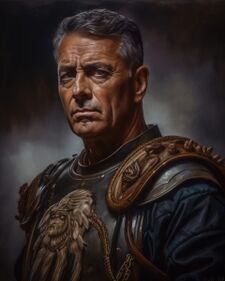Jacobus Claudius, Duke of Adrianople
This article is incomplete because it is pending further input from participants, or it is a work-in-progress by one author. Please comment on this article's talk page to share your input, comments and questions. Note: To contribute to this article, you may need to seek help from the author(s) of this page. |
The Illustrious The Duke of Adrianople CI EE EAA MCG ECC MCC ESM | |||||||||||||
|---|---|---|---|---|---|---|---|---|---|---|---|---|---|
 | |||||||||||||
| Consul of the Latin Empire | |||||||||||||
| In office 1 January 1975 – 31 December 1975 Serving with The Prince of Youth | |||||||||||||
| Monarch | Diana I Anicia Leo X Claudius | ||||||||||||
| Preceded by | Michael Claudius The Duke of Keld | ||||||||||||
| Succeeded by | Diana I Anicia Valens Poppaeus | ||||||||||||
| |||||||||||||
| Master of Offices | |||||||||||||
| In office 9 June 1947 – 31 October 1976 | |||||||||||||
| Monarch | Diana I Anicia Leo X Claduius | ||||||||||||
| Preceded by | Flavian Appuleius | ||||||||||||
| Succeeded by | Stephan Tullius | ||||||||||||
| Magister Militum in praesenti | |||||||||||||
| In office 19 April 1945 – 2 April 1970 | |||||||||||||
| Monarch | Diana I Anicia Leo X Claduius | ||||||||||||
| Preceded by | Georgius Papinianus | ||||||||||||
| Succeeded by | Justinus Vetilius | ||||||||||||
| Praeses Senatus | |||||||||||||
| In office 17 January 1946 – 23 July 1968 | |||||||||||||
| Monarch | Diana I Anicia | ||||||||||||
| Preceded by | John Arrius | ||||||||||||
| Succeeded by | Josephus Verrucosus | ||||||||||||
| Senate Minority Leader | |||||||||||||
| In office 22 August 1942 – 13 April 1945 | |||||||||||||
| Monarch | Constantine XIX Anicius | ||||||||||||
| Preceded by | Flavian Appuleius | ||||||||||||
| Succeeded by | Stephen Tullius | ||||||||||||
| 4th Latin Diplomatic Legate to Garza | |||||||||||||
| In office 22 February 1924 – 1 June 1929 | |||||||||||||
| Monarch | Marius IV Anicius | ||||||||||||
| Preceded by | Jordanes Egnatius | ||||||||||||
| Succeeded by | Constantine Ranius | ||||||||||||
| Senator of Latium | |||||||||||||
| In office 3 May 1920 – 31 October 1976 | |||||||||||||
| Personal details | |||||||||||||
| Born | Gaius Claudius Sabinus Iacobus Peterus Iacaerus Hadrianus 18 May 1895 Adrianople, Latium | ||||||||||||
| Died | 31 October 1976 (aged 81) Palatine, Castellum | ||||||||||||
| Political party | Populares | ||||||||||||
| Spouse | Valentia Martia (m. 1921) | ||||||||||||
| Relations | Claudii dynasty | ||||||||||||
| Children | 5 (inc. Leo X Claudius) | ||||||||||||
| Alma mater | Olympia | ||||||||||||
| Military service | |||||||||||||
| Allegiance | |||||||||||||
| Branch/service | |||||||||||||
| Years of service | 1911–1951 | ||||||||||||
| Rank | Chief Prefect | ||||||||||||
| Battles/wars | |||||||||||||
Jacobus Claudius, Duke of Adrianople, EE EAA MCG ECC MCC ESM (Gaius Claudius Sabinus Iacobus Peterus Iacaerus Hadrianus; 18 May 1895 – 31 October 1976), was a Latin nobleman, general, statesman, and one of the leading political and military figures in Latium during the 20th century.
Born in 1895, Claudius was the eldest son of Theodosius Claudius, Duke of Adrianople and Princess Isobel of Gaemar, and member of Claudii dynasty. Under an alternative succession to the Latin throne, Claudius would have been Emperor Jacobus X. His first government appointment was as Latin Ambassador to Garza, serving from 1924 until 1929. He was rumored to have been selected for the posting due to lobbying by his grandfather.
Claudius first served as Cohort Prefect in the Latin military from 1927 until 1933, with a military tribunate, first as Tribunus angusticlavius, in 1933. In 1945 he was appointed Master of Soldiers and chief military officer of all Latin forces during the Social War, by Empress Diana I Anicia in the wake of the Ascanium Massacre. During the Social War, Claudius quickly led Imperial forces to a string of victories in the surrender of Castellum, Pola and Ravenna. The war ended in 1949 following the Battle of Ascanium and the capture or death of members of republican high command.
Claudius held a number of high ranking offices both during and after the Social War. For a time he concurrently served as Master of Offices , Praeses Senatus, and Master of Soldiers, and has since been the only individual in modern memory to do so. He was first appointed Praeses Senatus during the Social War, in 1945, and served until stepping down from the role in 1968. He continued to hold the office of Master of Offices until his death, and Master of Soldiers until 1970. He served in the Senate from 1920 until his death in 1976. During his tenure, Claudius also led Latium through the 1972 Sydalene succession crisis and strengthened Latin ties in the eastern Periclean through the establishment of the Trans-Periclean Free Trade Area and P3.
Claudius is considered one of the greatest Latins of the 20th century for his actions during the Social War and its aftermath. Though not without controversy, Claudius was widely criticized for his poor and often brutal treatment of prisoners of war, including captured offices and leaders of opposing forces.